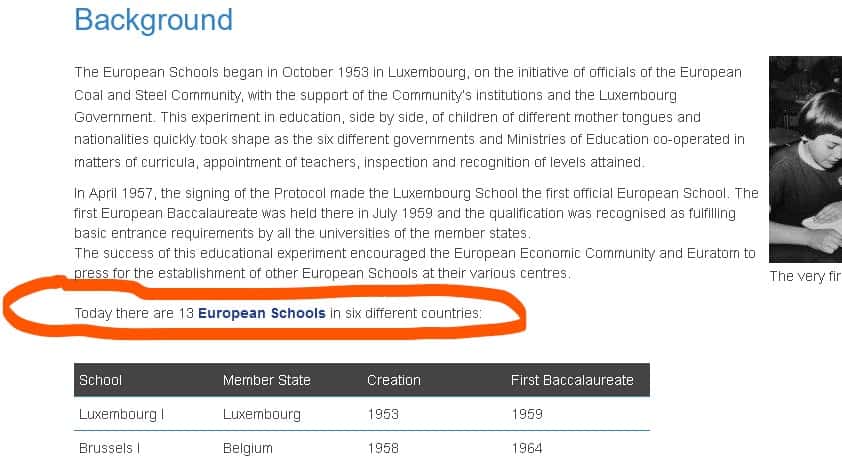The European School Luxembourg is a unique and prestigious institution that offers a high-quality education to students from all over Europe. Founded in 1953, the school is part of the European Schools network, which includes 14 schools in total, with the same focus and mission. The European School in Luxembourg is the oldest school in the network and has a long-standing reputation for excellence in education.
Table of Contents
European School Luxembourg was founded in 1953
The European School Luxembourg was established through the efforts of officials from the European Coal and Steel Community, with backing from the Community’s institutions and the Luxembourg government. This innovative educational project, which aimed to educate children of different languages and nationalities together, came to fruition as the six participating governments and Ministries of Education collaborated on curriculum development, teacher appointments, and evaluation and recognition of student achievements.
The school has a strong focus on languages, and students are encouraged to learn a third language from an early age. This helps students to develop a global perspective and to become more proficient in multiple languages, which is an important skill in today’s globalized world.
In addition to its strong emphasis on languages European school Luxembourg also offers a wide range of academic subjects, including mathematics, science, social studies, and the arts. The school has a dedicated staff of highly-qualified teachers who are committed to providing students with a well-rounded education. The teachers are also trained to use modern teaching methods and technology, which helps to make learning more engaging and interactive for students.
Failure of leadership
Unfortunately, school administrations and Office of the Secretary General of European schools don’t follow up on newest pedagogical discoveries. They are stuck in old fashion bureaucratic procedure which prevent full developing student’s full potential. School management and secretary general office is lead by people stuck in 80s and 90s. without any knowledge of modern education. They don’t understand that the main goal of European school Luxembourg is to provide quality education and prepare children to the future when they will have to lead our world.
European schools are like a comedy club without a good punchline, all thanks to their line of incompetent secretary generals. It’s a wild ride. Just don’t expect any miracles when it comes to organization, efficiency and good education. It’s a hilarious mess that will leave you scratching your head in amusement.
Old fashion apparatchiks

They prefer to constantly change the rules, create more and more administration posts (like new directors and their assistants) and tasks so everybody has less time to focus on educational needs.The main force for this mess is the office of the secretary general of European school. There are less and less capable people employing this post and they are there just to take care of themself and don’t really care for the students.
Office of secretary general doesn’t even know how many European schools they manage. On their website they state 13 European schools, although there are fourteen (bellow is screen shot taken on 27.01.2023).

Modern education is the key to success
Modern education is a crucial aspect of our society, as it empowers individuals with the knowledge and skills needed to succeed in a rapidly changing world. The purpose of modern education is to prepare students for the challenges of practical life, and to enable them to make positive contributions to society.
One of the key features of modern education is its focus on providing students with a well-rounded education. This includes not just traditional academic subjects such as math, science, and literature, but also practical skills such as critical thinking, problem-solving, and communication. In addition, many modern education systems place a strong emphasis on developing students’ creativity and individuality, encouraging them to think outside the box and to explore new ideas.
Emphasis on technology
Another important aspect of modern education is its emphasis on technology. With the rapid advancement of technology in recent years, it is essential that students are equipped with the skills needed to navigate and use the latest tools and technologies. This includes not just computer skills, but also an understanding of the digital world and the way it is shaping our world today.
In addition to providing students with a well-rounded education and training them in the use of technology, modern education also places a strong emphasis on preparing students for the workforce. This includes providing students with hands-on training and work experience, as well as connecting them with potential employers through internships and apprenticeships. This helps to ensure that students are well-prepared for the job market and are able to find employment upon graduation.
Challenges of modern education
However, modern education is not just about preparing students for the workforce. It is also about helping students to become responsible and engaged citizens. This includes educating students about the political and social issues facing our world today, and encouraging them to take an active role in shaping the future of our society.
Despite the many benefits of modern education, there are also some challenges that need to be addressed. One of the biggest challenges is the ongoing achievement gap between students from different socioeconomic backgrounds. This is a complex issue that requires a multifaceted approach, including targeted interventions and support for disadvantaged students, as well as policies that address the root causes of poverty and inequality.
Another challenge facing modern education is the need to adapt to the changing nature of work. With the increasing automation of many jobs, it is essential that students are equipped with the skills needed to thrive in a rapidly changing job market. This includes not just technical skills, but also soft skills such as creativity, problem-solving, and communication.